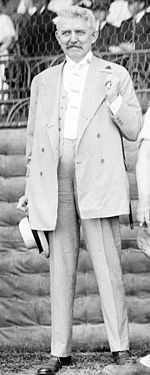Andrew Jackson Barchfeld
Andrew Jackson Barchfeld (born May 18, 1863 in Pittsburgh , Pennsylvania , † January 28, 1922 in Washington, DC ) was an American politician . Between 1905 and 1917 he represented the state of Pennsylvania in the US House of Representatives .
Career
Andrew Barchfeld attended Pittsburgh Central High School and then studied medicine at Jefferson Medical College in Philadelphia until 1884 . He then practiced as a doctor. He later ran a hospital. At the same time he embarked on a political career as a member of the Republican Party . He was a member of their state board for Pennsylvania. In 1902 he ran unsuccessfully for Congress .
In the congressional elections of 1904 , Barchfeld was elected to the US House of Representatives in Washington in the 32nd constituency of Pennsylvania, where he succeeded James W. Brown on March 4, 1905 . After five re-elections, he was able to complete six legislative terms in Congress by March 3, 1917. In 1905 he participated as a delegate at a peace conference in Brussels . In 1910 he was a member of an American commission that visited the Philippines ; In 1912 he was a member of the Panama Canal Commission. In 1913 the 16th and 17th amendments were ratified. It was about the nationwide introduction of income tax and the direct election of US senators .
In 1916 Barchfeld was not re-elected. He died on January 28, 1922, when the roof of a cinema called Knickerbocker Theater collapsed in Washington. The roof had collapsed under the snow load after heavy snowfall. In addition to Barchfeld, 97 other people were killed. 133 others were injured. Andrew Barchfeld was buried in Pittsburgh.
Web links
- Andrew Jackson Barchfeld in the Biographical Directory of the United States Congress (English)
- Andrew Jackson Barchfeld in the database of Find a Grave (English)
| predecessor | Office | successor |
|---|---|---|
| James W. Brown |
United States House of Representatives for Pennsylvania (32nd constituency) March 4, 1905 - March 3, 1917 |
Guy Edgar Campbell |
| personal data | |
|---|---|
| SURNAME | Barchfeld, Andrew Jackson |
| BRIEF DESCRIPTION | American politician |
| DATE OF BIRTH | May 18, 1863 |
| PLACE OF BIRTH | Pittsburgh , Pennsylvania |
| DATE OF DEATH | January 28, 1922 |
| Place of death | Washington, DC |
